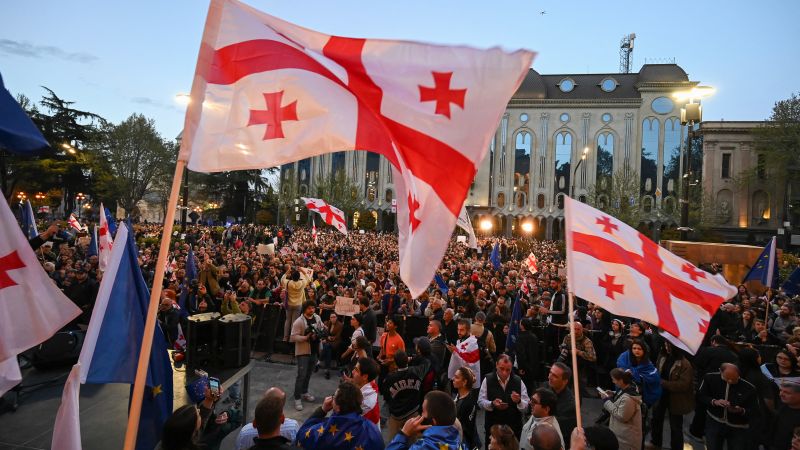
Georgia rocked by protests as government pushes Putin-style ‘foreign agent’ bill
CNN
After spending his days making wine in the foothills of the Caucasus Mountains, Tsotne Jafaridze returns home to Tbilisi, Georgia’s capital, and begins his new routine. He packs goggles, a gas mask and enough water and snacks to last several hours. He has another long night ahead.
After spending his days making wine in the foothills of the Caucasus Mountains, Tsotne Jafaridze returns home to Tbilisi, Georgia’s capital, and begins his new routine. He packs goggles, a gas mask and enough water and snacks to last several hours. He has another long night ahead. Jafaridze is among thousands of Georgians who have for the past month gathered each night outside the country’s parliament, facing down tear gas and water cannons fired by increasingly brutal police, to protest a bill they fear will torpedo its bid to join the European Union and push it further into the Kremlin’s orbit. “This has become my routine,” he told CNN. “If we don’t protect our freedom right now – our European and Western future – tomorrow we’re going to wake up in Russia. And that will be it.” The ruling Georgian Dream party is trying to force through a “foreign agent” law, likened by critics to a measure introduced by Russian President Vladimir Putin to quash dissent. The draft law, which has passed the second of three votes, would require organizations in the former Soviet country that receive more than 20% of their funding from abroad to register as “foreign agents” or face crippling fines. Jafaridze, who also owns a travel business and says he receives 95% of his income from foreign sources, says he would “immediately” be listed as a foreign agent under the broadly-written law. But critics say the intended target of the legislation is not business owners like him, but Georgia’s independent media and civil society organizations, ahead of elections in October in which Georgian Dream, whose popularity is waning, is desperate to keep power. Georgia’s government tried to pass the same law last year, but was forced into an embarrassing climbdown after a week of intense protests, which saw citizens waving EU flags buffeted back by water cannons. In a move widely seen as an effort to reward Georgia’s citizens – of whom about 80% support joining the bloc – and reverse the country’s drift towards Russia, the EU granted it candidate status in December.


